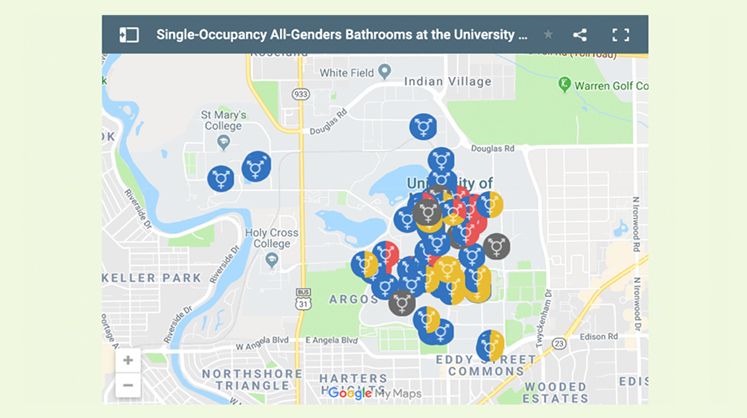
Mat Sisk, GIS/Anthropology Librarian with the Navari Center for Digital Scholarship, contributes to Gender Studies student research project
Imagine you’re sitting in class and your professor is trying to get out the last points of a lecture amidst a shuffling of papers and backpacks, but you aren’t listening because all you can think about is how badly you need to pee. When the professor finally ends class, you squeeze past your classmates and bolt out the door to the nearest set of bathrooms. It’s a close call, but you make it just in time.
Now imagine that bathroom wasn’t an option for you. Everyone needs to use the bathroom, but not all bathrooms were created with everyone in mind. Perhaps you use a wheelchair or are unable to navigate a small stall. Maybe you’re gender-nonconforming or trans, and a crowded, multi-stall bathroom poses a risk to your safety and privacy. Maybe you need menstrual products or a private sink. Maybe you don’t have to pee, but you do need a place to change your kid’s diaper. Or maybe you need some assistance in the bathroom, or to provide assistance to a loved one. Because everybody uses the bathroom, barriers to accessing public bathrooms are barriers to participation in public life.
Free2PeeND is a student research project that seeks to reduce barriers to safe and accessible bathrooms by locating, evaluating and mapping single-occupancy, all-genders bathrooms on the campuses of Notre Dame, Saint Mary’s, and Holy Cross. “Single-occupancy” refers to bathrooms with a single toilet and lockable main door; “all-genders” means anyone can use a facility, regardless of gender identity or expression; and “ADA-compliant” means the heights of the fixtures and the width of the door frame meet specifications set by the Americans with Disabilities Act. Our mission, simply put, is to provide equal access to bathrooms. We hold this to be in line with tri-campus community’s responsibility to uphold the dignity of every person, regardless of ability, gender, identity or access needs.
Developed by faculty advisor Dr. Pam Butler, associate director of Gender Studies at Notre Dame, the bathroom mapping project has involved the work of countless Gender Studies students and volunteers over the last two years. Free2PeeND has now compiled the data collected by students into an interactive Google map of all the public single-occupancy, all-genders bathrooms in the tri-campus community. This digital map includes nearly 100 bathrooms and uses symbols and colors to indicate which facilities meet ADA standards, offer menstrual products and/or include a diaper-changing table. It includes pictures of each bathroom with a detailed explanation of its location and resources. Soon, this resource will be added to the ND Mobile app map, so app users can find a bathroom that meets their needs the same way they would locate an accessible parking space or a printer station.
Multi-stall, gender-segregated facilities accommodate some people and bodies and exclude many others. Throughout our research, we have heard from men who have difficulty finding a diaper-changing table not located in a women’s bathroom, individuals who have been made to feel unsafe or uncomfortable using the bathroom due to their gender presentation, folks who want privacy to rinse out a menstrual cup or empty a colostomy bag and people of all ages who may need assistance using the bathroom, often from a caregiver of a different gender than themselves. Again, these examples present just a few situations in which easily located single-occupancy, all-genders bathrooms can make public space more inclusive.
Ultimately, Free2PeeND believes any individual who is a member or guest of the Notre Dame community deserves to feel safe and to have equal access to public space. Because bathroom use is universal, we see this resource as a step toward a more just and inclusive community. In providing this resource, we hope to communicate to all members of the Notre Dame family they are seen and they are valued. This is an inherent part of the University’s mission and rooted in the Catholic understanding of human dignity and social justice: To provide accessible bathrooms for all people is, in the words of the Notre Dame Mission Statement, to “create a sense of human solidarity and concern for the common good that will bear fruit as learning becomes service to justice.”
In the future, Free2PeeND will continue to gather data, update the map resource and advocate for universal bathroom access across the tri-campus community. Our next priority is to locate the dozens of single-occupancy restrooms on our campuses that are restricted by gendered signage and work to redesignate them as all-genders bathrooms. In our mission to provide equal access to bathrooms, we believe it is only fair to broaden access to these facilities and not limit access based on gender. Today and tomorrow, we hope everyone is free to pee at ND.
Pamela Butler, Associate director of Gender Studies
Sara Berumen, junior
Gregory Esrig, senior
Sarah Kelley, senior
Erin Lenke, senior
Michael Lodenquai, senior
Colin Mackey, junior
Amy Mansfield, senior
James Murphy, sophomore
Lia Rocchino, senior
Maddy Schierl, sophomore
James Zwierzynski, senior